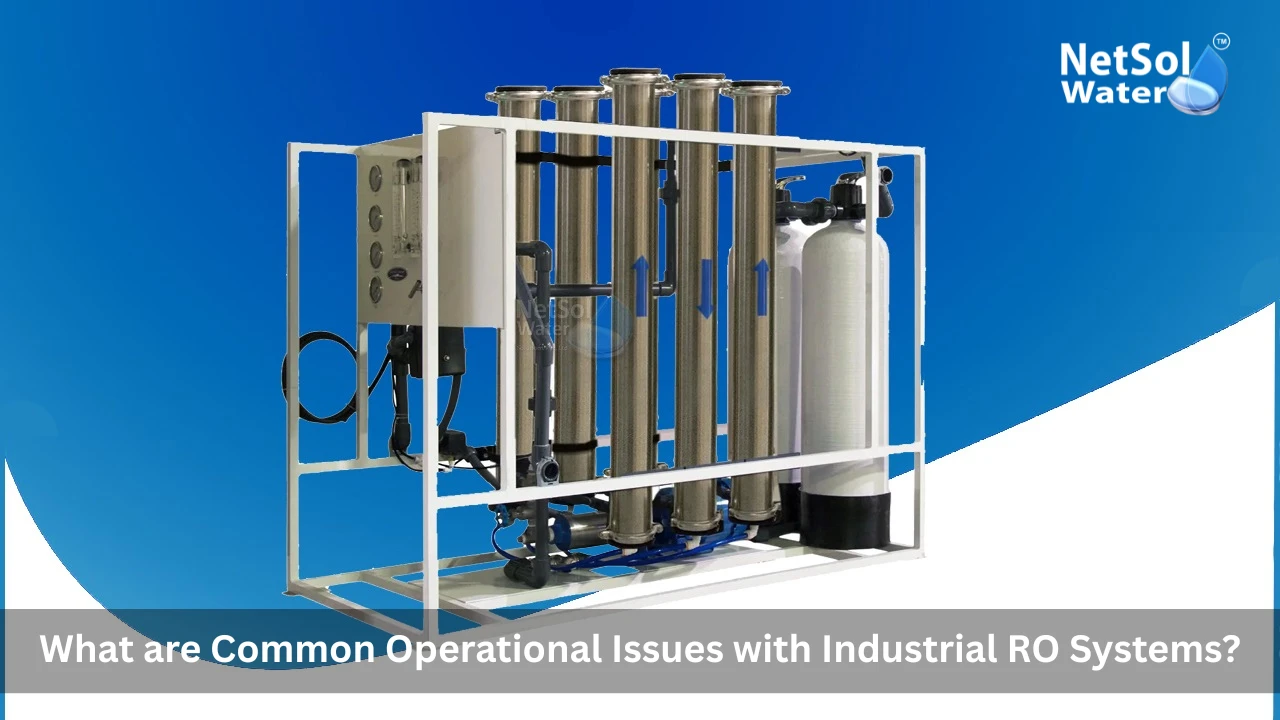
What are Common Operational Issues with Industrial RO Systems?
RO plants serve many industries in many places. An RO plant must work without operational issues to keep production lines moving and to keep water safe. Netsol Water is the leading RO Plant Manufacturer and it makes plants that many plants use. We will explore the common problems that affect industrial RO plants and how operators can spot and fix them.
Membrane fouling and scaling
Membranes form the heart of every RO plant. When membranes block or slow the flow the whole plant loses capacity. Understanding fouling and scaling helps teams plan regular cleaning and proper pretreatment.
Biological fouling
Biological growth can form slimy layers on the membrane surface. Bacteria and algae feed on organics in the feed water. Over time this build up reduces permeate flow and raises differential pressure across the membrane. Operators will notice lower output and higher energy use. A clear sign is a steady drop in product flow when feed conditions stay the same. Technicians must test for biological load in the feed water and in the system. Good pretreatment with disinfection and proper dosing stops many cases. Where growth appears the team must run a controlled cleaning cycle with approved cleaners and a proper rinse. Regular monitoring of biological markers prevents heavy growth. Netsol Water the leading RO Plant Manufacturer offers guidance on cleaning cycles and on safe dosing choices. Teams should also inspect prefilters and strainers. Clean filters reduce the food supply for organisms. When staff maintain the feed side they protect the membrane surface.
Scaling from hardness and salts
Mineral scale forms when dissolved salts concentrate and crystallize on the membrane surface. Hardness ions like calcium and magnesium cause crystalline deposits. Other ions may form scale under certain pH and temperature conditions. Scale reduces flux and it raises feed pressure. Early scale forms as thin patches that spread. When scale grows thick the membrane may suffer physical damage. Operators must measure recovery rates and monitor salt passage. A rapid rise in feed pressure often points to scale. Pretreatment with softening or with antiscalant chemicals helps prevent this problem. Where scale appears teams must stop the plant and perform an acid wash or a targeted cleaning. Careful control of recovery rate and softer feed water reduce the chance of heavy scale. The RO Plant Manufacturer can recommend antiscalant types based on a feed water report. When plants use those recommendations they avoid many costly shutdowns.
Mechanical and operational failures
Mechanical and control issues form the second major class of operational trouble. Pumps filters gauges and valves work together to keep a stable flow and pressure. When one part fails the whole plant can stop or run inefficiently. Let us have a look on some common mechanical failures and the ways teams can detect and fix them.
Pump failure and seal wear
Pumps drive the high pressure that pushes water through membranes. Pump problems show as vibration noise reduced pressure or leaks. Seal wear causes slow leaks and it invites air into the system. Air in the feed may cause cavitation and it can erode pump parts. Regular vibration checks and seal inspections catch wear early. Teams should follow a preventive maintenance plan that includes scheduled oil checks bearing inspection and seal replacement. Proper alignment and correct mounting reduce vibration and extend pump life. Where pumps show a sudden loss of pressure technicians must check the motor coupling and the inlet conditions. Clogged suction lines or closed valves can starve the pump and cause damage. The RO Plant Manufacturer provides pump sizing and startup checks that prevent many failures. Using those checks lowers unplanned downtime and keeps the plant efficient.
Instrumentation control and operator error
Control system faults and human error also cause performance loss. Faulty pressure sensors, wrong set points or a mis programmed controller can push the system into unsafe states. An operator may set a recovery rate above the recommended limit or may miss an alarm. Good practice requires clear operating procedures and routine calibration of all instruments. Automation helps when teams set safe limits and when alarms send clear messages. Training reduces the chance of wrong manual settings. When the control system logs data teams can trace small changes before they become big problems. The RO Plant Manufacturer often supplies startup support and training. When staff work with that support they learn the normal performance range and they spot deviations fast.
Read some interesting information for Effluent Treatment Plant Manufacturer
Conclusion
Industrial RO (Reverse Osmosis) plants face many common problems that include membrane fouling, scaling pump wear and control faults. Each issue can reduce output and raise cost. Netsol Water provides design, support, parts and service that help operators prevent and fix these issues. If you need a consultation contact Netsol Water the Industrial RO Plant Manufacturer today. Our team can review your feed water suggest a pretreatment plan and offer maintenance guidance. Get in touch for a site visit or for a technical consultation.
Contact Netsol Water at:
Phone: +91-9650608473
Email: enquiry@netsolwater.com
